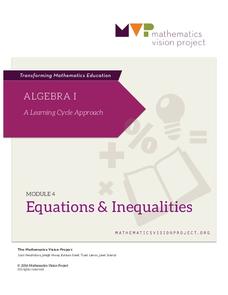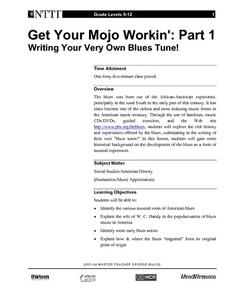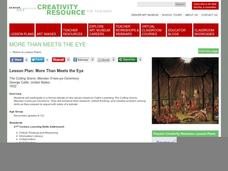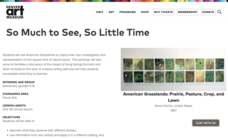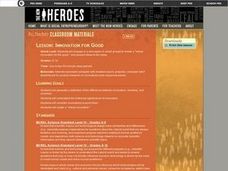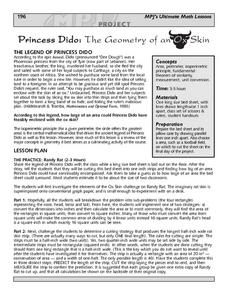EngageNY
Deriving the Quadratic Formula
Where did that formula come from? Lead pupils on a journey through completing the square to discover the creation of the quadratic formula. Individuals use the quadratic formula to solve quadratic equations and compare the method to...
Mathematics Vision Project
Module 4: Equations and Inequalities
Can you justify that mathematically? Help learners see the process of solving as using mathematical properties rather than a set of steps to memorize in the fourth module of a nine-part Algebra I series. The module contains six...
Illustrative Mathematics
Maria’s Marbles
Ali has more marbles than Maria in some of these word problems, while in others Maria has more marbles than Ali. First graders are tasked to read each word problem and solve how many marbles each girl has.
EngageNY
Using Trigonometry to Determine Area
What do you do when you don't think you have enough information? You look for another way to do the problem! Pupils combine what they know about finding the area of a triangle and trigonometry to determine triangle area when they don't...
Illustrative Mathematics
Sharing Markers
Let your first graders translate these word problems into subtraction sentences. Some of the equations involve finding the answer after Char gives some of her markers away, while others require finding the amount of markers Char started...
Curated OER
Get Your Mojo Workin': Part 1 Writing Your Very Own Blues Tune!
Upper graders listen to the blues. They discuss blues scale, read a description of the blues, and work together to write an original piece. A lesson like this ties into American history and African-American musical contributions very...
Curated OER
Creating an Original Opera
This may be a lot to ask of a high schooler, but then again, who knows? Pupils work in groups to explore, write, and then perform an original opera. They view versions of The Magic Flute and La Traviata, then compose a plot, characters,...
Concordia University Chicago
The Pietá by Michelangelo Buonarroti
Why is arts education so important? It builds critical thinking, analysis and creative problem-solving skills. Learners review the life of Michelangelo Buonarroti, and then analyze his piece, The Pieta. After that, they'll sculpt a human...
Curated OER
Lesson: More Than Meets the Eye
Older learners analyze a controversial painting entitled The Cutting Scene, Mandan O-kee-pa Ceremony 1832. They use the issues raised in the image to construct debate arguments questioning if the artist's painting exploits Native...
eGFI
Marshmallow Design Challenge
How tall is your marshmallow structure? With limited supplies (including uncooked spaghetti noodles, masking tape, and one marshmallow), teams endeavor to support the marshmallow atop the tallest spaghetti structure they can build....
EngageNY
Solving Percent Problems II
Fill in the blanks to find the best discount! Groups complete a table of amounts and percents associated with sale items. Classmates then find the original cost, sale cost, discount amount, paid percent, or the discount percent...
EngageNY
End-of-Module Assessment Task - Geometry (module 2)
Increase the level of assessment rigor with the test of performance tasks. Topics include similar triangles, trigonometric ratios, Law of Sines, Law of Cosines, and trigonometric problem solving.
Illustrative Mathematics
Friends Meeting on Bikes
It is the job of your mathematicians to figure out how fast Anya is riding her bike when meeting her friend. The problem shares the distance, time spent riding, and Taylor's speed leaving the last variable for your learners to solve. Use...
EngageNY
Solutions of a Linear Equation
Use the distributive property to solve equations. The sixth lesson in a 33-part series has scholars solve equations that need to be transformed into simpler equations first. Class members apply the distributive property to the equations...
Denver Art Museum
So Much to See, So Little Time
How do humans and animals impact the environment? What is land division? Youngsters tape off a 12x12 inch square in an outdoor natural space. They sketch everything they see, then compare their drawings as a class. They will then be...
Noyce Foundation
On Balance
Investigate the world of unknown quantities with a creative set of five lessons that provides problem situations for varying grade levels. Each problem presents a scenario of fruit with different weights and a balance scale. Using the...
Curated OER
Innovation for Good
Many historical innovations were created for the common good. Get your learners ready for life as a critical thinker with this lesson plan which defines the differences between innovation and invention. They will conduct Internet...
Noyce Foundation
First Rate
Explore distance and time factors to build an understanding of rates. A comprehensive set of problems target learners of all grade levels. The initial problem provides distance and time values and asks for the winner of a race. Another...
Noyce Foundation
Tri-Triangles
Develop an understanding of algebraic sequences through an exploration of patterns. Five leveled problems target grade levels from elementary through high school. Each problem asks young mathematicians to recognize a geometric pattern....
EngageNY
Solve for Unknown Angles—Angles and Lines at a Point
How do you solve for an unknown angle? In this sixth installment of a 36-part series, young mathematicians use concepts learned in middle school geometry to set up and solve linear equations to find angle measures.
EngageNY
End-of-Module Assessment Task: Grade 7 Mathematics Module 6
Determine the level of understanding within your classes using a summative assessment. As the final lesson in a 29-part module, the goal is to assess the topics addressed during the unit. Concepts range from linear angle relationships,...
Yummy Math
Raspberry Chocolate Heart Cake
Have you ever finished a piece of cake and wished you had more? Solve this common dilemma with math! A straightforward learning exercise prompts middle schoolers to use the given dimensions of a heart-shaped cake when planning to bake...
Discovery Education
Clutter Cutter
Challenge young learners to cut the clutter with this fun engineering project. As employees of a home and office supply company, young engineers are asked to develop devices that organize everyday items. After participating in a...
Curated OER
The Geometry Of An Ox Skin
High schoolers investigate the concepts of area and perimeter. The lesson uses a legend to create a context for the proposed word problem. They use the skill of estimation in order to create an ox skin that is found in the story.



